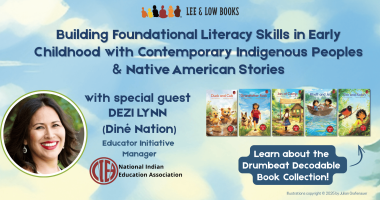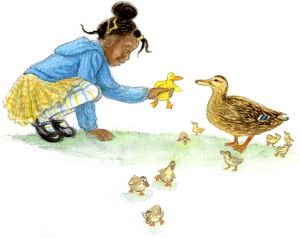
This weekend, The NYU Institute of African American Affairs hosted the A is for Anansi Conference on Literature for Children of African Descent. It was a great conference and I was thrilled to be a part of it – it’s always exciting to be in a room full of people who care about books, kids, and social justice issues. A few of the highlights I caught:
Author and publisher Andrea Davis Pinkney started things off with a good news/bad news keynote, sharing a few reasons why some say we are in a “Golden Age of African American Children’s Literature” – a new generation of talented authors and illustrators, more award recognition, etc. – but also shared these dismal numbers that tell us that the number of books by/about people of color has not increased at all since 1994. 1994! In other words, we’ve got our work cut out for us.
I spoke next on a panel about publishing/selling literature about children of African descent. Just Us Books owner Cheryl Willis Hudson moderated, and agent and former bookseller Joe Monti started off with some anecdotes about the resistance big book buyers have to selling covers with people of color. Ultimately, he said, he doesn’t believe race really makes a difference in sales. “A good cover will sell books, and a bad one won’t,” he said.
KT Horning, director of the Cooperative Children’s Book Center, asked an important question: “Why do people only pay attention to these issues when white people start talking about them?”
For my part, I talked about how Lee & Low Books is different from most mainstream publishers because we have to promote both our books and the idea that multicultural books are valuable. That means spending marketing time just talking about race and diversity issues, trying to help people understand 1.) the kinds of disparities and injustices that exist within the publishing industry and in society as a whole, and 2.) how supporting and reading multicultural books can help address those injustices long-term.
A few different authors and illustrators throughout the conference, including Colin Bootman and Nicole Tadgell, talked about how painful it is to work on a book for many months (or sometimes even years) only to see it relegated to the back of the shelves and only taken out for Black History Month.
Zetta Elliott asked some important questions about issues of identity & representation, and who has the power and right to tell stories. She also asked what kind of progress has been made when most books featuring African Americans still focus on historical/civil rights subjects. How do those books shape the identities of today’s young readers?
But my FAVORITE part of the whole conference was probably the next panel, a roundtable of 3 bright, articulate boys discussing books.
The boys talked about how a lot of books featuring black characters feel like problem books. In the words of one boy: “Most of them have problems they’re facing…they’re not like small-time teen problems, they’re like problems where they did something wrong and they’re trying to fix it.”
Another, when asked about how these “problem books” made him feel, said they gave him “a feeling of disappointment…or, is this going to be me when I grow up?”
I left the conference inspired by everyone’s dedication and even more aware of what’s at stake. Thanks to all who helped put it together!
Other conference reports from around the web:
Zetta Elliott has posted about the conference here and here
Cheryl Willis Hudson has a great rundown of our panel here
Summer Edwards offers her take
Monica Edinger wraps things up










